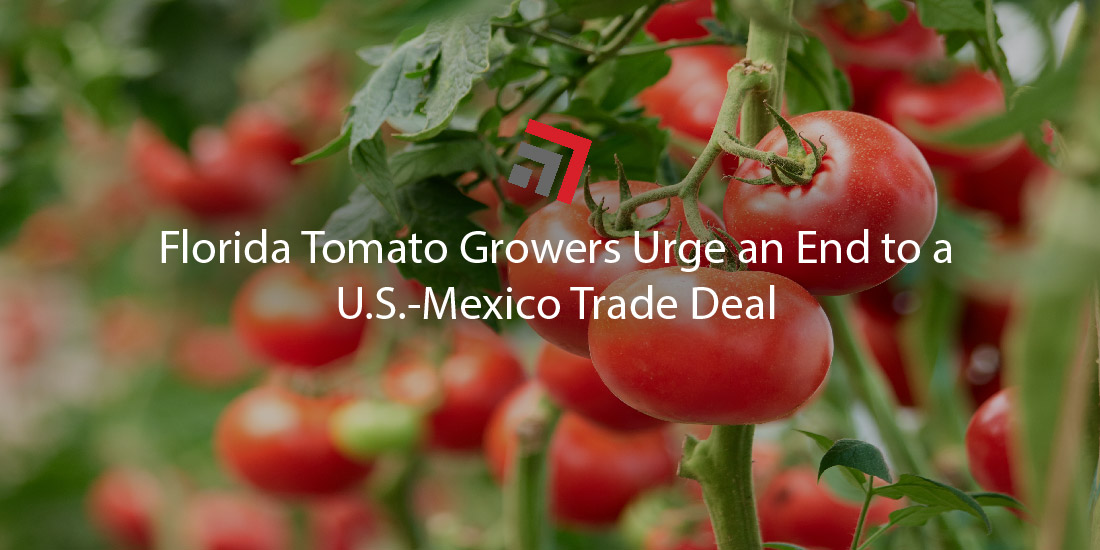When the news broke out that a tomato trade group is urging the U.S. to end the 2019 Tomato Suspension Agreement with Mexico, we could only picture regulators on a stage as growers huck tomatoes at them while booing emphatically.
Joke aside, the Florida Tomato Exchange (FTE) alleges the agreement has failed to protect Florida’s tomato growing populus against unfair trade practices.
“Despite the good faith efforts of the Commerce Department over the last four years, the 2019 Suspension Agreement has not been able to close the loopholes that have always been a problem,” FTE Executive Vice President Michael Schadler said in a statement.
The loopholes Schadler is referring to are Mexican growers flooding the U.S. market with cheap tomatoes. The group claims these commodities are sold for less than it costs to produce them. In return, the FTE contests the cheaper imports undercut the domestic market.
Fueled by these grievances, the FTE recently filed a request with the U.S Department of Commerce (DOC) to terminate the 2019 agreement and instead follow antidumping laws, more stringent legislation against tomato imports.
What is the Tomato Suspension Agreement?
Ironically, the DOC implemented the 2019 agreement with Mexican exporters to ensure fresh tomatoes grown south of the border don’t flood the American market with cheaper product.
The agreement essentially set a “reference price” for tomato imports. Mexican exporters have to sell fresh or chilled tomatoes (except ones for processing) at or above this floor price.
The reference price is seasonably adjusted and the agreement is enforced through mandatory inspections at border crossings.
Former DOC Secretary Wilbur Ross said, “[The agreement] brought the Mexican growers to the negotiating table and led to a result that protects U.S. tomato producers from unfair trade.”
In fact, at the time of the signing in 2019, the FTE itself called the deal “a step in the right direction.”
So, why has the trade group changed its mind? Why does it now see the agreement as a threat to domestic production?
Florida growers want the agreement terminated, others not so much
Over the last 27 years, there’s been five suspension agreements, including the most recent in 2019. The FTE asserts these well-intended actions have ultimately failed to protect the interests of domestic growers as Mexican tomatoes have continued being dumped into the U.S.
The trade group alludes to over “100 examples” the DOC has documented of Mexican companies failing to comply with the suspension agreement.
While FTE, representing growers in Florida, is calling for the agreement’s termination in favor of stricter law enforcement, the same can’t be said from others in the industry.
Arizona-based Fresh Produce Association of the Americas (FPAA) believes terminating it will only result in hurting American consumers.
In a news release scathingly titled “Seeking Monopoly, Florida Tomato Exchange At It Again with Off-Base Claims”, the FPAA didn’t hold back on the FTE’s claims.
“The FTE has been making the same false claims for years, but when pressed to present evidence in regulatory proceedings, they have failed to do so because their claims are untrue, nothing but propaganda intended to skew the political process to their advantage, regardless of the cost to consumers, retailers, and even other American farmers,” FPAA President Lance Jungmeyer said.
Jungmeyer went on say American consumers would end up paying higher tomato prices for less variety and quality.
Final Thoughts
Even if opinions on cross-border trade vary, there’s no denying the increased presence of Mexican tomatoes in the U.S. market.
In 1994, American growers supplied about 80 percent of the country’s tomato market while Mexico accounted for a modest 20 percent, according to the FTE. “Today, Mexico’s share of the U.S. market is almost 70 percent while U.S. producers have approximately 30 percent.”
The Mexican government reported that $2.7 billion worth of tomatoes were exported to the U.S. in 2022. Main points of entry are Laredo, Texas and Nogales, Arizona.
Please contact us if you have any questions regarding this topic or any others in domestic logistics. In addition, stay up to date with weekly headlines from both trucking and rail via our Road Map newsletter.
More blogs similar to this:



Recent Comments